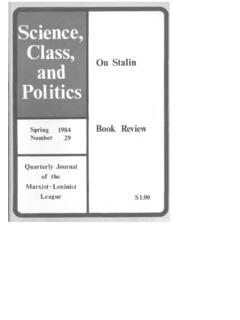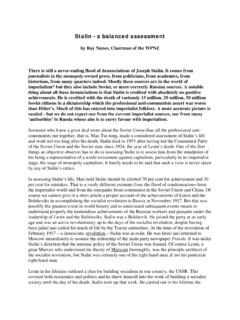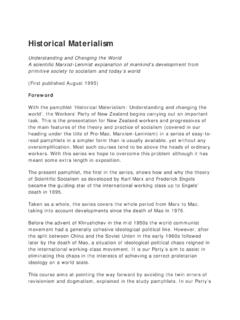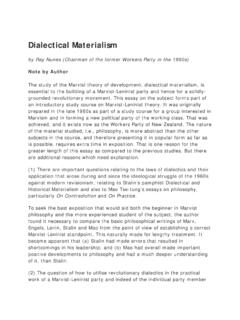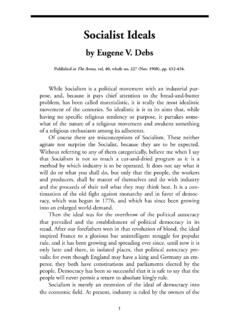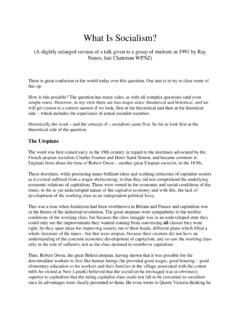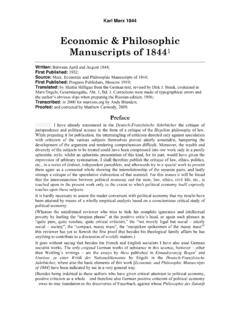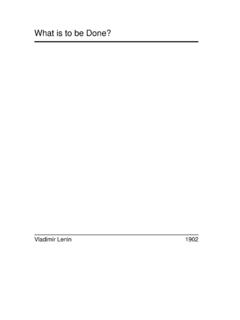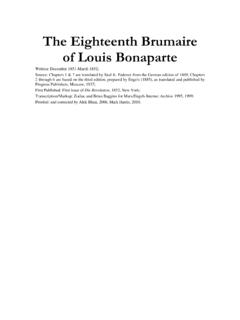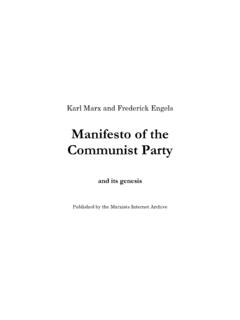Transcription of Socialism: Utopian and Scientific - Marxists
1 socialism : Utopian and ScientificFrederick EngelsFrom to eBook by Andrew LannanWritten: Between January and March of 1880;Source: Marx/Engels Selected Works, Volume 3, p. 95-151;Publisher: Progress Publishers, 1970;First Published: March, April, and May issues of Revue Socialiste in1880;Translated: from the French by Edward Aveling in 1892 (authorisedby Engels)Transcription/Markup: Zodiac/Brian Baggins;Online Version: Marx/Engels Internet Archive ( ) 1993,1999, Introduction to the French Edition by MarxWritten: May 5 1880;First published: in a pamphlet: F. Engels, Socialisme utopique etsocialisme scientifique, Paris, 1880;Source: MECW, Volume 24, the first English translation;Transcribed: by Andy last page of the manuscript contains a postscript in Marx shandwriting: Dear Lafargue, here is the fruit of my consultation (ofyesterday evening) with Engels.
2 Polish the phrases, leaving the gistintact. The introduction was initialled in the pamphlet. Theeditors of MECW used Marx s original manuscript and checked itagainst the text in the pages which form the subject of the present pamphlet, firstpublished as three articles in the Revue socialiste, have beentranslated from the latest book by Engels Revolution in Science [ ,Anti-D hring].Frederick Engels, one of the foremost representatives ofcontemporary socialism , distinguished himself in 1844 with hisOutlines of a Critique of Political Economy, which first appeared inthe Deutsch-Franz sische Jahrb cher, published in Paris by Marxand Ruge.
3 The Outlines already formulates certain general principlesof Scientific socialism . Engels was then living in Manchester, wherehe wrote (in German) The Condition of the Working-Class in England(1845), an important work to which Marx did full justice in his first stay in England he also contributed as he later didfrom Brussels to The Northern Star, the official journal of thesocialist [ Chartist] movement, and to the New Moral World ofRobert his stay in Brussels he and Marx founded the Germanworkers communist club, linked with Flemish and Walloon workingmen s clubs, and, with Bornstedt, the Deutsche-Br sseler Zeitung.
4 Atthe invitation of the German committee (residing in London) of theLeague of the Just, they joined this society, which had originallybeen set up by Karl Schapper after his flight from France, where hehad taken part in the Blanqui conspiracy of 1839. From then on theLeague was transformed into an international League ofCommunists after the suppression of the usual formalism of secretsocieties. Nevertheless, in those circumstances the society had toremain a secret as far as governments were concerned. In 1847 atthe International Congress held by the League in London, Marx andEngels were instructed to draft the Manifesto of the CommunistParty, published immediately before the February Revolution andtranslated [at once] into almost all the European languages.
5 [1]In the same year they were involved in founding the DemocraticAssociation of Brussels, an international and public association,where the delegates of the radical bourgeois and those of theproletarian[2] workers the February Revolution, Engels became one of the editors ofthe Neue Rheinische Zeitung (Nouvelle Gazette Rh nane), foundedin 1848 by Marx in cologne and suppressed in June 1849 by aPrussian coup d' tat. After taking part in the rising at ElberfeldEngels fought in the Baden[3] campaign against the Prussians (Juneand July 1849) as the aide-de-camp of Willich, who was then colonelof a battalion of 1850, in London, he contributed to the Review of the NeueRheinische Zeitung edited by Marx and printed in Hamburg.
6 ThereEngels for the first time published The Peasant War in Germany,which 19 years later appeared again in Leipzig as a pamphlet andran into three the resumption of the socialist movement in Germany, Engelscontributed to the Volksstaat and Vorwarts his most importantarticles, most of which were reprinted in the form of pamphlets suchas On Social Relations in Russia, The Prussian Schnapps in theGerman Reichstag, The Housing Question, The Cantonalist Rising inSpain,[The Bakunists at Work] 1870, after leaving Manchester for London, Engels joined theGeneral Council of the International, where he was entrusted withthe correspondence with Spain, Portugal and series of final articles which he contributed to the Vorw rtsunder the ironic title of Herr D hring s Revolution in Science (inresponse to the allegedly new theories of Mr.)
7 E. D hring on sciencein general and socialism in particular) were assembled in onevolume and were a great success among German socialists. In thepresent pamphlet we reproduce the most topical excerpt from thetheoretical section of the book, which constitutes what might betermed an introduction to Scientific In the 1880 French edition of the pamphlet Lafargue added here: The Communist Manifesto is one of the most valuable documents ofmodern socialism ; even today it remains one of the most vigorousand clearest expositions of the development of bourgeois societyand the formation of the proletariat which must put an end tocapitalist society.
8 As in The Poverty of Philosophy by Marx,published a year earlier, here, for the first time, the theory of classstruggle is clearly formulated. 2. The 1880 edition has socialist instead of proletarian The 1880 edition has and Palatinate inserted here. 1882 Preface to the First German EditionSource: MECW Volume 24, pp. 457-9;First published: in F. Engels, Die Entwicklung des Sozialismus vonder Utopie zur Wissenschaft, Hottingen-Zurich, 1882;The following work is derived from three chapters of my book: HerrnE. D rings Umwalzung der Wissenschaft, Leipzig, 1878.
9 I put themtogether for my friend Paul Lafargue for translation into French andadded a few extra remarks. The French translation revised by meappeared first in the Revue socialiste and then independently underthe title: Socialisme utopique et socialisme scientifique, Paris, rendering into Polish made from the French translation has justappeared in Geneva and bears the title: Socyjalizm utopijny anaukowy, Imprimerie de l Aurore, Gen ve, surprising success of the Lafargue translation in the French-speaking countries and especially in France itself forced me toconsider the question whether a separate German edition of thesethree chapters would not likewise be of value.
10 Then the editors of theZurich Sozialdemokrat informed me that a demand was generallybeing raised within the German Social-Democratic Party for thepublication of new propaganda pamphlets, and they asked mewhether I would not apply those three chapters to this purpose. I wasnaturally in agreement with that and put my work at their was, however, not originally written for immediate popularpropaganda. How could what was in the first place a purely scientificwork be suitable for that, What changes in form and content wererequired?So far as form is concerned, only the numerous foreign words couldarouse doubts.
